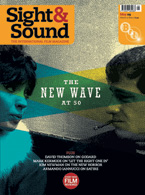
May 2009
Please view our back issues page for more information about obtaining previous months issues, dating back to 1995.
Features
 The New Wave at 50: The star reborn
The New Wave at 50: The star reborn
Half a century after a group of young French directors changed forever the way films are made, we assess the legacy of the nouvelle vague. The movement also transformed film acting, introducing a new kind of star, says Ginette Vincendeau
 The New Wave at 50: Riding the wave
The New Wave at 50: Riding the wave
Directors Jacques Audiard, Catherine Breillat, Charles Burnett, Claude Chabrol, Hou Hsiao-Hsien and Christophe Honoré on what the New Wave means to them now
The New Wave at 50: A priest and his flock
The critic André Bazin was a father figure for the New Wave directors, writes Nick James, but they didn't always practise what he preached
The New Wave at 50: Journey to the end of the beach
As Godard's Pierrot le fou is rereleased, David Thomson looks at how the breakdown of a love affair was played out both on and off the camera
The New Wave at 50: All the world's a stage
Jonathan Romney unearths the Alain Resnais 1963 classic Muriel, a film whose formal experimentation still seems daring today
The New Wave at 50: The ones that got away
The critical focus on a handful of big-name New Wave auteurs has obscured the wider explosion of French film-making at the time, says Geoffrey Nowell-Smith
That was the war that was
Armando Iannucci's television work has exposed the uselessness of British politicians, not least in The Thick of It. So where did he go to broaden the scope of its sister film In the Loop, asks Lisa Mullen? America, of course
The new horror
Breaking the mould of the vampire film and the coming-of-age story - and what's expected of Swedish cinema - Let the Right One In is one of those uncategorisable masterpieces best described in terms of what it isn't, says Mark Kermode PLUS Kim Newman surveys the contemporary horror scene, and concludes that what's missing is a sense of meaning
Body language
When John Wrathall's screenplay Good was filmed, it gave him the chance to watch Viggo Mortensen at work, and to see how a film actor makes a role his own
Selected reviews
 DVD review: Exposed
DVD review: Exposed
The 1970s Swedish sex movie 'Exposed' is, says Tim Lucas, unexpectedly subversive and full of almost Buñuelian ruses
 Tony Manero
Tony Manero
A disturbing portrait of a Travolta-obsessed sociopath in Pinochet's Chile, Pablo Larraín's 'Tony Manero' is less about the dreams of the disco era than about the realities of life under dictatorship, says Jonathan Romney
Reviews in this issue:
- Afghan Star
- Alone
- Blue Eyelids
- The Boat That Rocked
- Bottle Shock
- The Burning Plain
- Chéri
- Coraline
- The Damned United
- Delta
- Diminished Capacity
- Duplicity
- Encounters at the End of the World
- The End
- Everlasting Moments
- DVD review: Exposed
- Good
- The Grocer's Son
- Helen
- In the Loop
- Is Anybody There?
- King of the Hill
- Knowing
- Lesbian Vampire Killers
- Let the Right One In
- The Life before Her Eyes
- Little Ashes
- Martyrs
- Momma's Man
- My Name Is Bruce
- Not Easily Broken
- Observe and Report
- O'Horten
- Race to Witch Mountain
- Shifty
- Sounds like Teen Spirit
- Tony Manero
- Watchmen
- The World Unseen

 Chéri
Chéri The Damned United
The Damned United